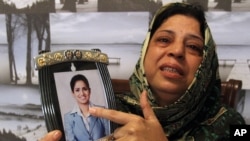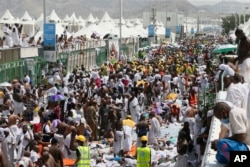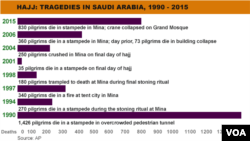The annual Hajj pilgrimage in Saudi Arabia ended without further incident Saturday, as the death toll from Thursday's stampede there reached 769.
Saudi Health Minister Khalid al-Falih said Saturday that 934 people were injured in the crush at Mina, on the outskirts of the holy city of Mecca. Iranians constitute the largest group of deaths identified so far, 136. Iranian state TV said a former ambassador to Lebanon was among more than 300 Iranians still missing.
Tehran accused the Saudis of "crimes" and incompetence, and it vowed to take legal action in international courts. Iranian leaders said the Saudi kingdom was no longer capable of managing an event that draws more than 2 million people each year.
Iran's state prosecutor, Ebrahim Raisi, said Saudi Arabia's poor management of the crowds of pilgrims amounted to criminal acts "under international law." Speaking on state television in Iran, he repeated an unconfirmed story contending that local authorities caused the fatal crowding by diverting pilgrims away from a road that was being used by a convoy of the Saudi royal family.
Iran's president, Hassan Rouhani, called on the United Nations to investigate the cause of the stampede "and other similar incidents in this year's hajj."
Rouhani addressed world leaders at a U.N. development summit Saturday. His foreign minister, Mohammad Zarif, also deplored "the disastrous event in Saudi Arabia" during his separate talks with U.S. Secretary of State John Kerry in another part of New York.
In New York, Saudi Foreign Minister Adel al-Jubeir rejected the Iranian criticism, saying, "The Iranians should know better than to play politics with a tragedy that has befallen people who were performing their most sacred religious duty."
He said that "if mistakes were made, [the people] who made them will be held accountable. And we will make sure that we will learn from this, and we will make sure that it doesn't happen again."
Leaders of both Iran and Saudi Arabia see their nations as playing a dominant role in the Muslim world. In additional to being regional rivals, Iranians and Saudis are divided on religious issues, most people in Iran are Shi'ite Muslims, while a majority of Saudi citizens practice Sunni Islam.







